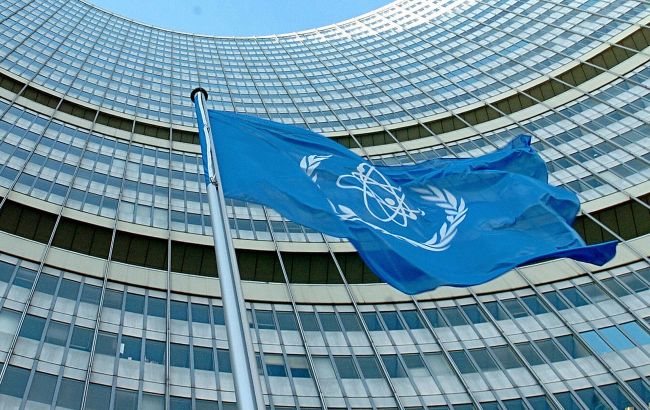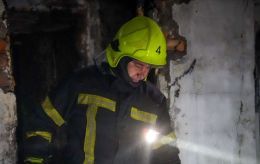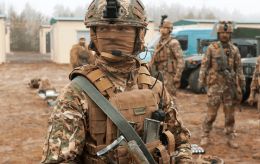Iran reopens doors to IAEA, inspection team to visit soon
 Iran may allow inspectors to resume monitoring nuclear activity in the country (Photo: Getty Images)
Iran may allow inspectors to resume monitoring nuclear activity in the country (Photo: Getty Images)
Iran has decided to renew its cooperation with the International Atomic Energy Agency (IAEA) regarding its nuclear program. A delegation of international inspectors is expected to visit the country in the coming weeks, according to The Wall Street Journal.
An Iranian senior official stated that Tehran will host a delegation from the IAEA within the next few weeks. This marks the first indication that the country may allow international inspectors to resume monitoring its nuclear activities.
The move comes ahead of scheduled talks between Iran and European countries set for Friday, July 25.
During the talks, the parties will explore the prospects of resuming negotiations between Iran and the US following Israeli and American military strikes on Iranian nuclear sites in June.
No return to previous inspections
Iran’s Deputy Foreign Minister, Kazem Gharibabadi, told reporters in New York that IAEA representatives will soon visit Tehran to discuss the scope of authority that might be granted to inspectors for resuming monitoring of Iran’s key nuclear facilities.
Gharibabadi said that this was once again a demonstration of goodwill from Iran. He was one of Iran’s lead negotiators during the spring talks with the Trump administration and planned to take part in the upcoming meeting with European officials.
However, he did not confirm whether inspectors would ultimately be allowed access to Iran’s main nuclear sites — Fordow, Isfahan, and Natanz — which were targeted by US strikes.
In recent weeks, Iranian officials have stated that inspections cannot resume in the same format as before.
Gharibabadi also showed no signs of flexibility on the key issue dividing Tehran and Washington: Iran’s firm refusal to halt uranium enrichment. He declared that Iran would not become fully dependent on foreign supplies of nuclear fuel, as demanded by the Trump administration.
Former US officials and experts believe that the return of inspectors could help determine which parts of Iran’s nuclear program remain intact and lay the groundwork for a broader diplomatic agreement to limit Tehran’s nuclear ambitions.
An IAEA spokesperson declined to comment on the upcoming visit. However, he noted that Director General Rafael Grossi continues to stress to all parties the need for a diplomatic solution based on mandatory IAEA verification and monitoring.
Risk of new sanctions
Inspectors previously made regular visits to Iran’s main uranium enrichment sites in Natanz and Fordow, as well as in Isfahan, where key nuclear infrastructure is located.
Last week, European foreign ministers told Iranian Foreign Minister Abbas Araghchi that they may delay the reimposition of international sanctions against Iran if Tehran resumes negotiations with the Trump administration and reestablishes cooperation with the IAEA.
The UK, France, and Germany warned that without progress toward a new nuclear deal, they will reinstate sanctions lifted under the 2015 nuclear agreement by the end of August. The option to restore those sanctions expires in October.
According to Gharibabadi, if the 2015 sanctions are reimposed, Iran may withdraw from the Treaty on the Non-Proliferation of Nuclear Weapons (NPT), which obliges non-nuclear-weapon states not to develop nuclear arms.
Gharibabadi added that they would respond and react, emphasizing that they must respond to this. He did not rule out the possibility of Iran leaving the NPT.
Suspension of Iran–IAEA cooperation
Following US and Israeli strikes on Iran in late June, Tehran passed a law suspending its cooperation with the International Atomic Energy Agency (IAEA). Iranian officials accused the agency of escalating tensions with Israel by releasing data on Iran’s growing stockpile of enriched uranium and other nuclear activities.
Subsequently, IAEA Director General Rafael Grossi withdrew the agency’s inspectors from Iran due to safety concerns.
The Pentagon stated that the US and Israeli strikes set Iran’s nuclear program back by two years. However, there remains significant uncertainty about the amount of enriched uranium Iran still possesses—especially material close to weapons-grade levels reportedly stored at the Isfahan facility.
Israel has concluded that it survived the June strike intact. According to an Israeli official, part of the enriched material could potentially be recovered, though it would require major effort.
Iran insists that its nuclear program is peaceful. The US and its allies argue that Tehran is developing the capability to build a nuclear weapon, although American intelligence indicates that Iran’s Supreme Leader has not yet decided to proceed with weaponization.
Recently, US President Donald Trump stated that if Iran rebuilds its nuclear facilities, they will be destroyed.
For more details on the possible paths to restarting negotiations on the nuclear deal with Iran, read our article.

